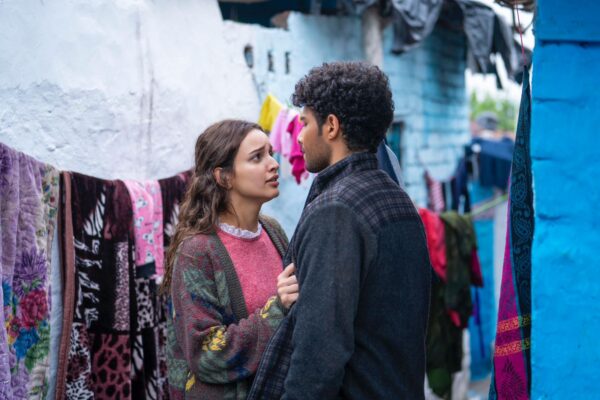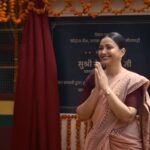Casteism and caste discrimination have been depicted in Indian cinema for decades. Fictional or (sometimes) based on real stories (the latest being the recent biopic, Phule), these movies have spoken about the primary and seemingly-perennial social scourge of India, with varying degrees of intensity.
Dhadak 2, based on the Tamil film, Pariyerum Perumal (which was inspired by director Selvaraj’s 2012 short story collection, Thamirabaraniyil Kollapadathavaragal) is the latest movie to deal with this. The title comes inspired from Dhadak, as it fits that film’s concept of forbidden love, since the villain is primarily the caste system and then the human beings who implement it. Dhadak in turn was based on the Marathi hit, Sairaat.
Dhadak 2, however, supersedes both those movies on merit. Its intensity is scorching, searing, gut-wrenching. Imagine a man named Shankar (Saurabh Sachdeva) who is a master at the kind of honor-killing that comes across as an accident or as suicide. He says proudly, “I am not a criminal. I am cleaning up society.” He even vows that the day he fails at a job, he will commit suicide!
Over to the protagonists: Neelesh (Siddhant Chaturvedi) is the son of a Dalit (Vipin Sharma, excellent!) who is a folk dancer in drag, and proud of his profession. They live in a slum precinct, and Neelesh is a drummer and part of a band that plays for weddings. By a fortuitous chance, he meets Vidhi (Triptii Dimri), from a clan of lawyers, on one such occasion, and their friendship grows especially when both join the same Law college, he to improve his position and she to maintain the family legacy. Neelesh has joined under the Quota for backward people provision, while Vidhi belongs to the upper-class Bharadwaj clan. Their classmates include her caste-(hyper) conscious cousin Ronnie (Saad Bilgrami), and Vasu (Aditya Thakare), who becomes Neelesh’s friend.
Trouble looms when Vidhi, now in love with Neelesh, invites him for her sister’s wedding. Suspecting the worst, her father takes him aside and tries to explain the social chasm between them, but Ronnie and his cohorts come and beat him up and even urinate on him.
Depressed and disillusioned, Neelesh stops going to class, does not answer Vidhi’s call and breaks contact. Vidhi guesses at why he is staying away as a mental reservation, unaware of her family’s role. Ronnie continues his taunts and machinations, and finally its showdown time. Vidhi confronts her family, and Ronnie’s father decides to use Shankar’s services to get rid of Neelesh. What happens next?
The film makes searing points, admittedly not new but (re-)told with passion and intensity, about social discrimination. Director and co-writer Shazia Iqbal, who makes her directorial debut, happily adapts the story well to the pan-Indian scenario by making the right changes, instead of the wrong ones as seen in most current remakes of South films of varied genres, like with Selfiee. A crucial change is showing the college principal, Haider Ansari (Zakir Hussain) as a lower-caste Muslim, showing that such outdated regressive attitudes are not restricted to Hinduism. Because he has suffered and fought his way out of it, he advises Neelesh to fight rather than surrender.
Several other sequences stand out in the narrative: Vidhi’s quizzing her sister’s prospective mother-in-law, Neelesh bringing in a ‘fake’ father to meet the principal, his real father being hazed by Ronnie, the brutal murder of Neelesh’s dog, the final climax where Vidhi lets out a prolonged cry of sheer anguish, and a lower-class student’s suicide.
The dialogues are real, economic, incisive and far from melodramatic. The lyrics (Rashmi Virag, Siddharth-Garima, Gurpreet Saini and Ozil Dalal) are well-written, though the compositions bring them down. In fact, the song that leaves the most impact is the re-used Hum jo kaam karte hain, written by Anjaan for the 1987 film Muqaddar Ka Faisla and enacted by Vipin Sharma—that film was also produced by Dharma Productions! Technically on par, the film is boosted by the lead pair.
Siddhanth Chaturvedi is plain fabulous as Neelesh, his anguish, anger and initial weakness depicted with rare honesty. Even when he metamorphoses into a raging rebel, there is no unnaturally fake transformation into a vendetta machine, but a driven-by-circumstances helplessness translating into organic anger. inspired both by his principal and principles!
Triptii Dimri is among the better performers to have emerged in the last few years. She is note-perfect as the frustrated girl who comes to realize that her family of lawyers has no qualms about breaking the law and disregarding the provisions of our Constitution, all for some ephemeral honor!
Vipin Sharma and Zakir Hussain apart (and they are superb), Anubha Fatehpura as Neelesh’s mother, Harish Khanna as Vidhi’s father, Aditya Thakare as Vasu and Priyank Tiwari as Shekhar impress. Saurabh Sachdeva is fantastic as the fanatical Shankar. Saad Bilgrami makes a mark as Ronnie.
A vast improvement on the earlier film in what may be now coming up as a franchise, Dhadak 2deserves a visit—without discrimination!
Rating: ***1/2
Dharma Productions’, Zee Studios & Cloud 9 Pictures’ Dhadak 2 Produced by: Karan Johar, Umesh Kumar Bansal, Adar Poonawalla, Apoorva Mehta, Meenu Aroraa, Somen Mishra & Pragati Deshmukh Directed by: Shazia Iqbal Written by: Mari Selvaraj, Shazia Iqbal & Rahul Badwelkar Music: Rochak Kohli, Tanishk Bagchi, Javed-Mohsin & Shreyas Puranik Starring: Siddhant Chaturvedi, Triptii Dimri, Vipin Sharma, Zakir Hussain, Anubha Fatehpuria, Saurabh Sachdeva, Harish Khanna, Priyank Tiwari, Saad Bilgrami, Abhay Joshi, Deeksha Joshi, Manjiri Pupala, Aditya Thakare & others
(Used under special arrangement with NIT)






